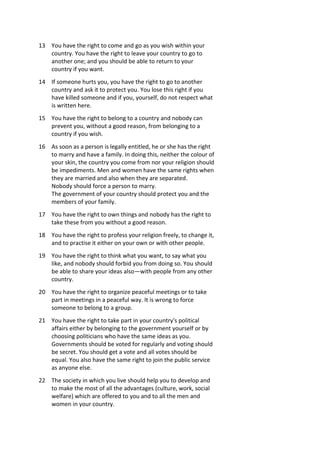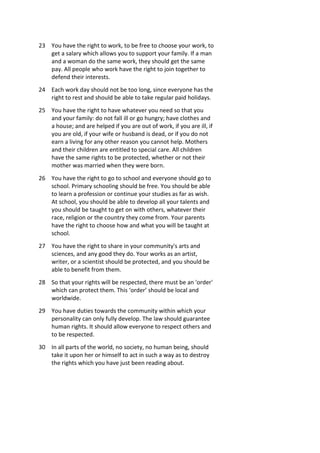Universal declaration of human rights handout
- 1. Universal Declaration of Human Rights 1 When children are born, they are free and each should be treated in the same way. They have reason and conscience and should act towards one another in a friendly manner. 2 Everyone can claim the following rights, despite - a different sex - a different skin colour - speaking a different language - thinking different things - believing in another religion - owning more or less - being born in another social group - coming from another country It also makes no difference whether the country you live in is independent or not. 3 You have the right to live, and to live in freedom and safety. 4 Nobody has the right to treat you as his or her slave and you should not make anyone your slave. 5 Nobody has the right to torture you. 6 You should be legally protected in the same way everywhere, and like everyone else. 7 The law is the same for everyone; it should be applied in the same way to all. 8 You should be able to ask for legal help when the rights your country grants you are not respected. 9 Nobody has the right to put you in prison, to keep you there, or to send you away from your country unjustly, or without good reason. 10 If you go on trial this should be done in public. The people who try you should not let themselves be influenced by others. 11 You should be considered innocent until it can be proved that you are guilty. If you are accused of a crime, you should always have the right to defend yourself. Nobody has the right to condemn you and punish you for something you have not done. 12 You have the right to ask to be protected if someone tries to harm your good name, enter your house, open your letters, or bother you or your family without a good reason.
- 2. 13 You have the right to come and go as you wish within your country. You have the right to leave your country to go to another one; and you should be able to return to your country if you want. 14 If someone hurts you, you have the right to go to another country and ask it to protect you. You lose this right if you have killed someone and if you, yourself, do not respect what is written here. 15 You have the right to belong to a country and nobody can prevent you, without a good reason, from belonging to a country if you wish. 16 As soon as a person is legally entitled, he or she has the right to marry and have a family. In doing this, neither the colour of your skin, the country you come from nor your religion should be impediments. Men and women have the same rights when they are married and also when they are separated. Nobody should force a person to marry. The government of your country should protect you and the members of your family. 17 You have the right to own things and nobody has the right to take these from you without a good reason. 18 You have the right to profess your religion freely, to change it, and to practise it either on your own or with other people. 19 You have the right to think what you want, to say what you like, and nobody should forbid you from doing so. You should be able to share your ideas alsoŌĆöwith people from any other country. 20 You have the right to organize peaceful meetings or to take part in meetings in a peaceful way. It is wrong to force someone to belong to a group. 21 You have the right to take part in your country's political affairs either by belonging to the government yourself or by choosing politicians who have the same ideas as you. Governments should be voted for regularly and voting should be secret. You should get a vote and all votes should be equal. You also have the same right to join the public service as anyone else. 22 The society in which you live should help you to develop and to make the most of all the advantages (culture, work, social welfare) which are offered to you and to all the men and women in your country.
- 3. 23 You have the right to work, to be free to choose your work, to get a salary which allows you to support your family. If a man and a woman do the same work, they should get the same pay. All people who work have the right to join together to defend their interests. 24 Each work day should not be too long, since everyone has the right to rest and should be able to take regular paid holidays. 25 You have the right to have whatever you need so that you and your family: do not fall ill or go hungry; have clothes and a house; and are helped if you are out of work, if you are ill, if you are old, if your wife or husband is dead, or if you do not earn a living for any other reason you cannot help. Mothers and their children are entitled to special care. All children have the same rights to be protected, whether or not their mother was married when they were born. 26 You have the right to go to school and everyone should go to school. Primary schooling should be free. You should be able to learn a profession or continue your studies as far as wish. At school, you should be able to develop all your talents and you should be taught to get on with others, whatever their race, religion or the country they come from. Your parents have the right to choose how and what you will be taught at school. 27 You have the right to share in your community's arts and sciences, and any good they do. Your works as an artist, writer, or a scientist should be protected, and you should be able to benefit from them. 28 So that your rights will be respected, there must be an 'order' which can protect them. This ŌĆśorderŌĆÖ should be local and worldwide. 29 You have duties towards the community within which your personality can only fully develop. The law should guarantee human rights. It should allow everyone to respect others and to be respected. 30 In all parts of the world, no society, no human being, should take it upon her or himself to act in such a way as to destroy the rights which you have just been reading about.



